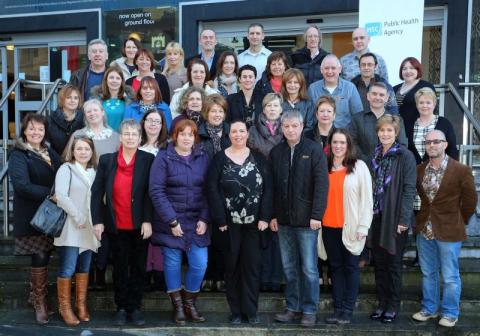ASIST training helping to tackle suicide

Work to help communities prevent suicide has taken a further step forward with over 50 ASIST Trainers from across Northern Ireland completing the new ASIST 11 upgrader trainer course.
The Applied Suicide Intervention Skills Training (ASIST) enables people in a position of trust to recognise risk and learn how to intervene to prevent the immediate risk of suicide.
The Public Health Agency (PHA) funded the upgrading training as part of their ongoing commitment to supporting quality training for a range of individuals, communities and organisations.
Madeline Heaney, the PHA’s strategic lead for Suicide Prevention, explained: “This programme enables people who have been trained to become more willing, ready and able to help those at risk of suicide, which can be vital in a crisis situation.
“We want to empower people who are in position of responsibility and care to know what to do if they find themselves in a situation where someone is at risk of taking their own lives.”
ASIST has been delivered in Northern Ireland since 2003 and the course is designed for all caregivers or any person in a position of trust, making it useful for a range of people. The training is suitable for mental health professionals, nurses, doctors, pharmacists, teachers, counsellors, youth workers, police and prison staff, school support staff, clergy, community volunteers and the general public.
This most recent training, which ASIST Trainers must complete, builds on previous editions and offers advances that help meet current challenges and provides new opportunities in helping to reduce suicides within communities.
The intensive Trainer Upgrade was held in Derry/ Londonderry.
More information on looking after your mental health and the support which is available across Northern Ireland can be found at www.mindingyourhead.info
You can also talk to your GP for advice.
If you or someone you know is in distress or despair, call Lifeline on 0808 808 8000. This is a confidential service, where trained counsellors will listen and help immediately on the phone and follow up with other support if necessary. The helpline is available 24 hours a day, seven days a week. You can also access the Lifeline website at www.lifelinehelpline.info
